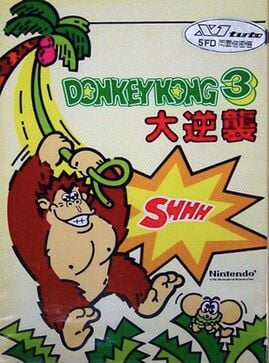Donkey Kong 3: Dai Gyakushū: Difference between revisions
m (Text replacement - "{{([Ss]erials|[Rr]elease)\|" to "{{flag list|") |
Tags: Mobile edit Advanced mobile edit |
||
| Line 48: | Line 48: | ||
==Staff== | ==Staff== | ||
===Main programmer=== | ===Main programmer=== | ||
*Fumihiko Itagaki (Ita) | *[[Fumihiko Itagaki]] (Ita) | ||
==Gallery== | ==Gallery== | ||
Revision as of 11:22, October 4, 2024
The title of this article is official, but it comes from a non-English source. If an acceptable English source is found, then the article should be moved to its appropriate title.
| Donkey Kong 3: Dai Gyakushū | |
|---|---|
 The box art of the Sharp X1 version of Donkey Kong 3: Dai Gyakushū. For alternate box art, see the game's gallery. | |
| Developer | Hudson Soft |
| Publisher | Hudson Soft |
| Platform(s) | PC-6001mkII/PC-6601, PC-8801, X1, IBM JX |
| Release date | |
| Genre | Fixed shooter |
| Mode(s) | Single player |
| Format | 3, 3.5, 5.25-inch floppy |
Donkey Kong 3: Dai Gyakushū is a game developed and published by Hudson Soft in 1984. The game had versions for the PC-6001mkII/PC-6601, PC-8801, X1, and IBM JX,[1] all of which had differences between each other (palette and flow of gameplay, respectively). Hudson released it at the same time as Mario Bros. Special.[2]
Unlike Punch Ball Mario Bros. and Mario Bros. Special, the game was not released on the FM-7; a version was planned and possibly even completely programmed, but was canceled for unknown reasons.[3]
Gameplay
Like Mario Bros. Special and Punch Ball Mario Bros., the game is not a port, but more of a semi-sequel to Donkey Kong 3. Stanley's ability to jump is removed, along with the need to protect plants, making it much closer to a traditional shooter, à la Galaga.
Enemies come down from the top of the screen in groups of five, swooping to the bottom and trying to target Stanley. After swooping around a bit, the enemies will exit the screen (usually from the bottom, though sometimes from the sides) and loop back around to the top. This will continue until Stanley dies, shoots Donkey Kong to the top of the screen, thus completing it, or kills the five insects, all of which take two hits apiece to kill. If Stanley kills all five insects before any of them loop back to the top of the screen, a flag reminiscent of one from Rally-X will appear, and shooting it will net him 1,000 points.
Stages
There are twenty new stages, looping back at Stage 21.
- On the Highway
- On the Strange Bridge
- On the Country Road
- The Aliens
- In the U.F.O.
- Leaving the Earth
- In the Astron Belt
- Around the Saturn
- A Mysterious Planet
- On the Desert
- By the Pyramid
- In the Cave
- At the Active Volcano
- In the Active Crater
- At the Dome
- On the Ground Picture
- At the Runway
- A Mushroom Cloud
- At the Sunset
- In the City
Every five stages a Bonus Stage comes up, where Stanley must spray all the bugs before the time runs out. Each new stage has a unique background that seemingly moves the game's setting into the countryside, through space, and eventually into a city on an alien planet. According to programmer Fumihiko Itagaki, these backgrounds are photos converted to images simply for aesthetic reasons.[4] The manual encourages the player to imagine and send their own story to Hudson.[5]
Staff
Main programmer
- Fumihiko Itagaki (Ita)
Gallery
- For this subject's image gallery, see Gallery:Donkey Kong 3: Dai Gyakushū.
Names in other languages
| Language | Name | Meaning | Notes |
|---|---|---|---|
| Japanese | ドンキーコング3 大逆襲 (box) Donkey Kong 3 大逆襲 (title screen)[?] Donkī Kongu Surī Dai Gyakushū |
Donkey Kong 3: Great Counterstrike |
References
- ^ IBM-JX Personal Computer October 1986
- ^ September 1984 issue of Oh! MZ
- ^ Oh!FM-7
- ^ Press Start To Continue (December 28, 2021). Donkey Kong’s Most Creepy Mystery. YouTube. Retrieved January 2, 2022. (Screenshot.)
- ^ Donkey Kong 3: Dai Gyakushū manual.



